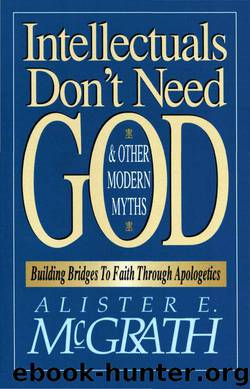Intellectuals Don't Need God and Other Modern Myths: Building Bridges to Faith Through Apologetics by McGrath Alister E

Author:McGrath, Alister E. [McGrath, Alister E.]
Language: eng
Format: epub
ISBN: 9780310877271
Publisher: Zondervan
Published: 2010-12-21T00:00:00+00:00
But consider my friend Francis, who is fortunate enough to have dual nationality.
Francis is British.
Francis is Swiss.
A logical contradiction exists if, and only if, being British excludes being Swiss. But it does not. And why, at the logical level, should being human exclude Jesus from being divine? Might he not be a citizen of heaven as well as of earth?
The charge of logical incoherence thus remains unpersuasive, except to those precommitted, for whatever reason, to anti-incarna-tional viewpoints. At times Hick seems to reject incarnationalism because of the difficulties it raises for his theory of religions, which is more than a little disrupted by the traditional doctrine of the Incarnation. Hick’s interest in challenging the doctrine seems to be motivated by a quite different agenda, concerned with the homogeni-zation of religions—a process to which the doctrine of the divinity of Christ is a serious stumbling block.
More seriously, Hick seems to work on the basis of the assumption that he already knows exactly what God is like, and that on the basis of this knowledge he is in a position to pass judgment on the logical niceties of the Incarnation. But this is obviously not the case. (None of us has privileged access to God in this way; we are all limited in our knowledge of God, which is why the news that God has revealed himself is such good news. We need to be told what God is like; left to our own devices, we would wallow about in confusion and chaos.) Hick may be saying that there is a logical problem involved with classical theism (a philosophical system) in relation to the Incarnation—but this merely suggests that classical theism is not necessarily compatible with Christianity. (This point has been made in recent years with increasing force by theologians such as Jürgen Moltmann and Eberhard Jüngel.) It is not to discredit the Incarnation. Hick may be in a position to say that God is totally unable to come among us as a human being and that the Incarnation is impossible on account of who and what God is—but if he can do so, he would seem to have access to a private and infallible knowledge of God denied to the rest of us. And do we really fully understand what is meant by that deceptively familiar word human? Many of us would prefer to say that the Incarnation discloses the true nature of divinity and humanity, rather than approaching the Incarnation on the basis of preconceived ideas of divinity and humanity.
Critics of the Incarnation appear to envisage their criticisms as establishing a new, more relevant and universal version of Christianity. But what might this new version of Christianity be like? The inclusion of the word “new” is deliberate: historically, Christianity has regarded both the Resurrection and the Incarnation as essential to its historical self-understanding, and any attempt to eliminate or radically modify them would seem to lead to a version of Christianity that is not continuous with the historical forms it has taken in the course of its development.
Download
This site does not store any files on its server. We only index and link to content provided by other sites. Please contact the content providers to delete copyright contents if any and email us, we'll remove relevant links or contents immediately.
| Buddhism | Christianity |
| Ethnic & Tribal | General |
| Hinduism | Islam |
| Judaism | New Age, Mythology & Occult |
| Religion, Politics & State |
Cecilia; Or, Memoirs of an Heiress — Volume 1 by Fanny Burney(31350)
Cecilia; Or, Memoirs of an Heiress — Volume 3 by Fanny Burney(30947)
Cecilia; Or, Memoirs of an Heiress — Volume 2 by Fanny Burney(30907)
The Secret History by Donna Tartt(16657)
Sapiens: A Brief History of Humankind by Yuval Noah Harari(13073)
Leonardo da Vinci by Walter Isaacson(11917)
The Radium Girls by Kate Moore(10915)
Sapiens by Yuval Noah Harari(4551)
The Wind in My Hair by Masih Alinejad(4427)
How Democracies Die by Steven Levitsky & Daniel Ziblatt(4412)
Homo Deus: A Brief History of Tomorrow by Yuval Noah Harari(4289)
Endurance: Shackleton's Incredible Voyage by Alfred Lansing(3854)
The Silk Roads by Peter Frankopan(3779)
Man's Search for Meaning by Viktor Frankl(3647)
Millionaire: The Philanderer, Gambler, and Duelist Who Invented Modern Finance by Janet Gleeson(3575)
The Rape of Nanking by Iris Chang(3526)
Hitler in Los Angeles by Steven J. Ross(3447)
The Motorcycle Diaries by Ernesto Che Guevara(3344)
Joan of Arc by Mary Gordon(3269)
